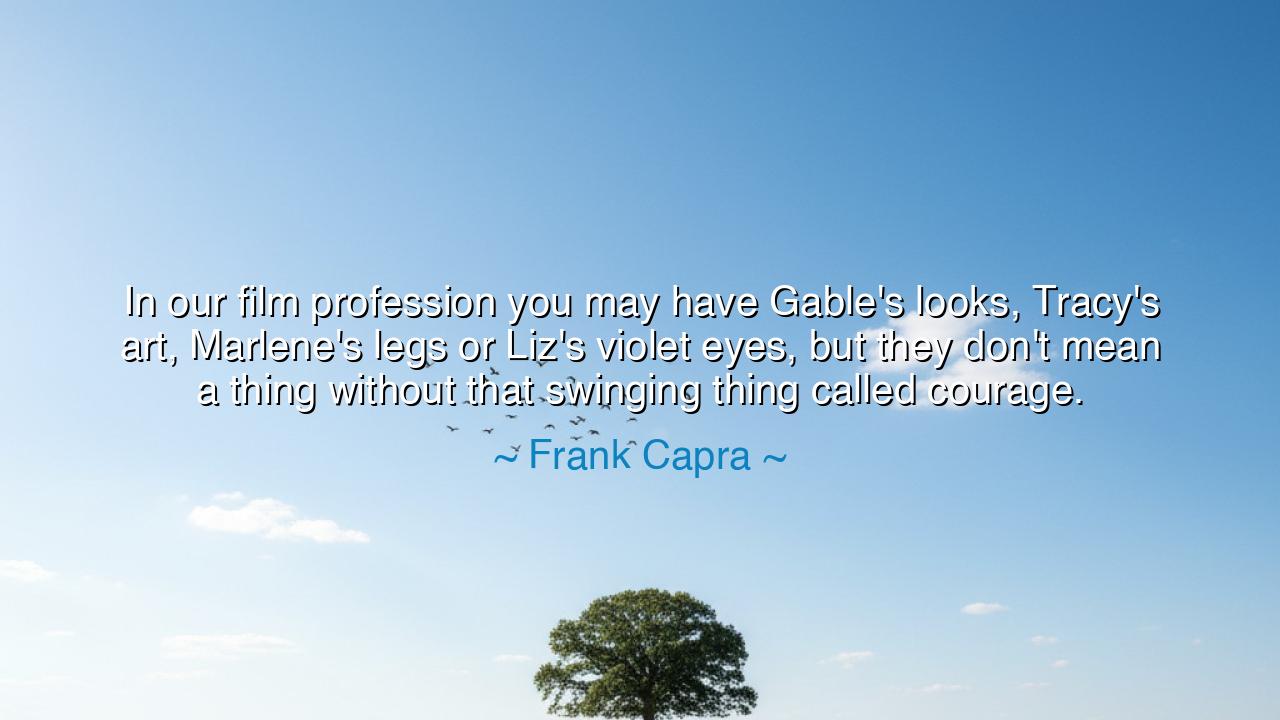
In our film profession you may have Gable's looks, Tracy's art
In our film profession you may have Gable's looks, Tracy's art, Marlene's legs or Liz's violet eyes, but they don't mean a thing without that swinging thing called courage.






The great filmmaker Frank Capra, whose works illuminated both the heart and conscience of cinema, once declared: “In our film profession you may have Gable’s looks, Tracy’s art, Marlene’s legs or Liz’s violet eyes, but they don’t mean a thing without that swinging thing called courage.” In this vivid and timeless statement, Capra stripped away the glittering façade of fame to reveal the pulse of true artistry — courage, that fearless energy of the soul that turns talent into truth. His words echo not only through the corridors of Hollywood, but through the ages, reminding all who create, perform, or dream that beauty, skill, and charm are nothing without the bravery to risk, to fail, and to feel.
The origin of this quote lies in Capra’s own life and vision as one of cinema’s most moral storytellers. Born to humble Sicilian roots and raised in poverty, he rose to become one of America’s most beloved directors, crafting films such as It’s a Wonderful Life, Mr. Smith Goes to Washington, and You Can’t Take It With You. His works were not mere entertainment — they were acts of faith in the decency and dignity of ordinary people. Capra understood that the film industry, though adorned with glamour, was a test of the spirit. He had seen actors with beauty, directors with brilliance, and producers with wealth — yet none of these qualities could create greatness unless joined by the courage to tell the truth, to resist cynicism, and to bring light where the world preferred darkness.
When he spoke of Gable’s looks, Tracy’s art, Marlene’s legs, and Liz’s violet eyes, Capra named the icons of his era — symbols of allure, mastery, and fame. Yet he reminded his peers that these gifts, however dazzling, were fragile without courage, the one quality that gives life to all others. For in the world of film — as in life — courage is what allows the artist to be vulnerable before the camera, to reveal not perfection but humanity. It is what compels the storyteller to challenge convention, to speak against injustice, or to pour their heart into their craft despite the sneers of critics or the coldness of commerce.
Capra himself displayed this moral courage time and again. In the 1930s, when cynicism was fashionable and despair filled the world, he made films that affirmed faith, hope, and kindness. Mr. Smith Goes to Washington was denounced by powerful politicians as dangerous, yet Capra refused to soften his message. He believed that truth must never bow to convenience. Similarly, It’s a Wonderful Life — now a beloved classic — was a failure upon release, rejected by the very audiences it was made for. But Capra stood by it, saying, “This film is my gift to God.” That steadfastness, born of conviction rather than applause, is the courage of which he spoke — the courage to create not what the world demands, but what the soul believes in.
We can see this same spirit reflected in countless stories of artists and dreamers who dared to follow their convictions. Think of Charlie Chaplin, who risked exile and public scorn for his political honesty, or Katharine Hepburn, who defied Hollywood’s expectations to live and work on her own terms. Each of them possessed not only talent but fearless authenticity — that “swinging thing called courage” which Capra so admired. Talent makes art possible; courage makes it immortal.
But Capra’s wisdom extends beyond the silver screen. His words apply to every human endeavor. In every life, there comes a moment when beauty fades, skill falters, and certainty vanishes — and it is courage alone that sustains us. The worker who speaks truth to power, the parent who endures for their child, the teacher who ignites minds in a world of indifference — these too are artists of life, sculpting goodness from adversity. Without courage, even the brightest gifts turn hollow; with it, even ordinary souls shine with greatness.
Therefore, let all who seek meaning in their craft or calling remember this truth: courage is the lifeblood of creation. Be not afraid to fail, to stand apart, to speak your truth when silence would be safer. For courage is not the absence of fear but the triumph of the heart over it. If you would live fully — whether as artist, leader, or lover — then cultivate this sacred fire within you. Let your life be your performance, your convictions your script, and your courage the light that never dims.
In the end, Frank Capra’s message rings clear and eternal: the world may value beauty, talent, and fame, but it bows before courage. For courage transforms art into meaning, and life into legacy. To act with courage is to claim your humanity — and to inspire others to claim theirs. Whether before a camera or before the face of destiny itself, let every soul remember: greatness begins not with the gifts we possess, but with the courage to use them.






AAdministratorAdministrator
Welcome, honored guests. Please leave a comment, we will respond soon